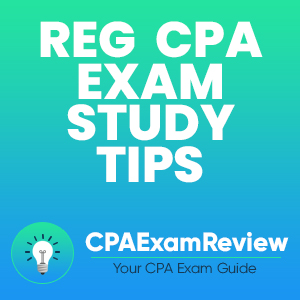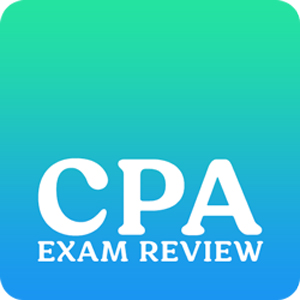 The Regulation (REG) section of the CPA exam is a rigorous test encompassing taxation, business law, ethics, and federal regulations. This section demands not only a deep understanding of the subject matter but also the ability to apply complex regulations to various scenarios.
The Regulation (REG) section of the CPA exam is a rigorous test encompassing taxation, business law, ethics, and federal regulations. This section demands not only a deep understanding of the subject matter but also the ability to apply complex regulations to various scenarios.
For many candidates, REG can be particularly challenging due to its detailed and expansive content.
In this article, we provide 15 essential study tips to help you prepare effectively and pass the REG section of the CPA exam.
15 Study Tips to Ace the Regulations CPA Exam Section
Contents
- 15 Study Tips to Ace the Regulations CPA Exam Section
- #1 Understanding the REG Exam Content
- #2 Developing a Structured Study Plan
- #3 Focusing on Key Taxation Principles
- #4 Utilizing Various Study Resources
- #5 Practice with Multiple-Choice Questions and Simulations
- #6 Understanding Business Law and Ethics
- #7 Regularly Reviewing IRS Publications
- #8 Strengthening Application Skills
- #9 Incorporating Real-World Tax Situations
- #10 Utilizing Flashcards for Memorization
- #11 Participating in Study Groups
- #12 Regular Review and Reinforcement
- #13 Time Management During Exam Preparation
- #14 Prioritizing Health and Well-being
- #15 Practice Research
- Bottom Line
- Frequently Asked Questions
- What Are the Most Challenging Topics in the REG Section of the CPA Exam, and How Should I Study for Them?
- How Can I Improve My Application of Tax Laws and Regulations When Preparing for the REG Exam?
- What Strategies Should I Employ to Tackle the Business Law Section of the REG Exam?
- Is There a Recommended Number of Study Hours for the REG Section of the CPA Exam?
#1 Understanding the REG Exam Content
The REG section covers a wide array of topics, including federal taxation of individuals, corporations, and partnerships, ethics and professional responsibilities in tax practice, and business law.
Understanding the scope and depth of the REG syllabus is crucial. Familiarize yourself with each topic and its weight in the exam to allocate your study time appropriately.
#2 Developing a Structured Study Plan
A structured study plan is key to covering the extensive material in the REG exam. Create a schedule that breaks down the syllabus into manageable sections, dedicating time to each topic proportionate to its complexity and exam weightage.
Include regular intervals for review and practice tests in your plan. Consistency and discipline in following your study plan are essential for success.
#3 Focusing on Key Taxation Principles
Taxation principles form the core of the REG exam. Focus on understanding the fundamental concepts and regulations in taxation. Rather than merely memorizing rules, concentrate on how these principles apply to different tax scenarios.
This conceptual understanding is vital for answering the exam’s practical, scenario-based questions effectively.
#4 Utilizing Various Study Resources
Diverse study materials can enrich your learning experience. Textbooks and review courses offer comprehensive coverage, while online tutorials and video lectures can provide more engaging explanations of complex topics.
Use IRS publications and official guidelines as references to ensure you’re studying the most current information.
#5 Practice with Multiple-Choice Questions and Simulations
Regular practice with multiple-choice questions and task-based simulations is critical. These exercises help reinforce your knowledge and improve your ability to apply concepts.
Additionally, they familiarize you with the exam format and improve your time management skills.
#6 Understanding Business Law and Ethics
Business law and ethics are significant components of REG. Develop a strong grasp of contracts, commercial transactions, and professional ethical standards.
Apply legal concepts to practical scenarios to better understand their implications in a business context.
#7 Regularly Reviewing IRS Publications
IRS publications are primary sources for many taxation topics in REG. Regularly review these publications to understand how rules and regulations are officially interpreted and applied.
Incorporate them into your study routine to stay aligned with the most accurate and up-to-date tax information.
#8 Strengthening Application Skills
The ability to apply tax laws and regulations to various situations is crucial for REG. Focus on solving practice problems and scenarios that require you to think critically and apply your knowledge.
Understanding the rationale behind tax laws will aid in this application process.
#9 Incorporating Real-World Tax Situations
Using real-world tax situations in your study can make learning more practical and relevant. Study case studies or examples from current events that illustrate the application of tax laws.
This approach will help you understand the practical implications of theoretical knowledge.
#10 Utilizing Flashcards for Memorization
Flashcards are excellent tools for memorizing key terms, rules, and concepts.
They are particularly useful for review and can be easily integrated into your daily routine. Create your flashcards with concise definitions and explanations to facilitate quick recall.
#11 Participating in Study Groups
Study groups provide opportunities for collaborative learning. Discussing topics with peers can deepen your understanding and provide different perspectives on complex issues.
Participating in forums or group discussions also keeps you engaged and motivated throughout your study process.
#12 Regular Review and Reinforcement
Consistent review is crucial for long-term retention of knowledge. Set aside time for regular review sessions, revisiting previously studied material to reinforce your understanding.
This repeated exposure to the content will solidify your grasp of the topics.
#13 Time Management During Exam Preparation
Effective time management is vital in your preparation for REG. Balance in-depth study sessions with shorter review periods.
Also, manage your time during practice exams to simulate the time constraints you will face on the actual exam day.
#14 Prioritizing Health and Well-being
Maintaining physical and mental well-being is critical during your exam preparation. Ensure that you get adequate rest, eat healthily, and engage in physical activities to reduce stress.
Taking care of your well-being will improve your focus and efficiency while studying.
#15 Practice Research
The REG section is the only CPA exam part that includes a research task-based simulation question that requires you to look up information about the tax code. It’s important to understand how to use the research database as well as how to cite the code sections.
Use your exam simulation software to practice researching and looking up tax information and code sections, so you won’t get caught off guard on your exam day when it comes to the task based simulations. This should be an easy question.
Make sure you are prepared for it!
Bottom Line
Preparing for the REG section of the CPA exam requires a balanced approach, combining in-depth study, regular practice, and a focus on well-being. By following these 15 study tips, you can enhance your understanding of the complex topics covered in REG and increase your chances of passing.
Remember, the journey to becoming a CPA is challenging but rewarding, and each step you take brings you closer to achieving your professional goals.
Frequently Asked Questions
What Are the Most Challenging Topics in the REG Section of the CPA Exam, and How Should I Study for Them?
The most challenging topics in the REG section typically include corporate taxation, partnership taxation, and the nuances of business law. To effectively study these areas, focus on understanding the underlying principles and regulations.
Utilize various study resources, such as textbooks and online courses, which provide in-depth explanations and examples. Regularly practicing with multiple-choice questions and simulations can also greatly aid in mastering these complex topics.
How Can I Improve My Application of Tax Laws and Regulations When Preparing for the REG Exam?
To improve your application of tax laws and regulations for the REG exam, it’s crucial to engage in practical problem-solving. Work on a wide range of practice questions that require applying tax laws to different scenarios.
Studying case studies and real-world examples can also help in understanding the practical application of these laws. Additionally, regularly reviewing and interpreting IRS publications will provide a deeper insight into the application of tax rules.
What Strategies Should I Employ to Tackle the Business Law Section of the REG Exam?
For the business law section of the REG exam, focus on key areas such as contracts, agency, and commercial paper. Develop a solid understanding of legal terminologies and principles. Practice with scenario-based questions to get accustomed to the type of questions asked in the exam.
Creating summary notes and flashcards for quick review of legal principles can also be beneficial. Engaging in discussions with peers or mentors about complex legal scenarios can further enhance your understanding.
Is There a Recommended Number of Study Hours for the REG Section of the CPA Exam?
The recommended number of study hours for the REG section varies based on individual familiarity with the material and learning pace. However, a general guideline is to dedicate around 100-150 hours of study time for REG.
This should include a mix of reading course materials, practicing multiple-choice questions and simulations, and reviewing key concepts. It’s essential to create a structured study plan and allocate time efficiently across different topics, ensuring that both taxation and business law receive adequate attention.

